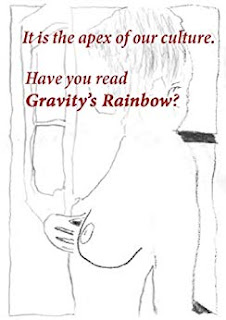Wanna get
lit hip quick? Don't look to me to get you there. You gotta have a
New York City connection, and I've been there only twice: once
spending a night on a friend's sailboat, and the other in a friend's
4th
floor Manhattan apartment after being trapped in an elevator for a
millennium and next morning
finding my car, parked on the street below, had been broken into.
Something evidently frightened the thief off, as he or she left his
or her tire iron under the hood. It was my only souvenir from
that trip—the rusty tire iron—and I kept it for years under the
front seat of every vehicle I've
owned since then. Probly somewhere in my Ford Ranger Sport model
pickup as I type this guide to the guide to getting lit hip quick,
It
is
the Apex of Our
Culture: "Have you read Gravity’s Rainbow?"
To answer the Apex
question, yes, I've read Gravity's Rainbow, but only after two
or three false starts, always giving up at the advent of the giant
walking adenoid, thinking at that point I might be losing my mind. I
finally decided I had to read the damned thing all the way through if
I ever wanted to at least be able to talk lit hip, so I did (and, in
doing so, very possibly did lose at least part of my mind—but also
gained a new respect, bordering on awe, for adenoids, mine, and, in
fact, everyone's). It was the same year I finally read Moby Dick
after two or three false starts, spaced about a decade apart. Reading
Moby Dick did nothing to advance me toward lit hipness, but I
do know a lot more now about whales, presented in vaguely King
Jamesian biblical dialect that occasionally soared so majestically I
could almost hear Gregory Peck's maddened voice wailing over
the waves, and the stomping around on his God damned peg leg.
 |
| Kinmonth |
I should note—by God I do
note!—I was given entré
to the coveted lit status
by prominent New York City photographer Rob Kinmonth, who’d
recommended Gravity’s
Rainbow to me when
we were colleagues in Newport News, Va. at his hometown newspaper. Or
maybe it was V
he recommended. I started that, too, and pooped out before the end
for fear of losing my mind without even the goading of a superhuman
adenoid. Or maybe it was just Pynchon Rob recommended. Both V
and GR
are giant novels, which might also have
played a deniable role
in my half-hearted early attempts. The one I finished first was
the novella, The
Crying of Lot 49,
which, finally, blew my mind all over the seat on the train from
Newport News to
Philadelphia and back
reading
the thing and learning
therein to live equanimically with my latent paranoia and propensity
to explode with laughter at word combinations plumbing nuances I
never could have explained to anyone—not even a lit hipster—nor
could I now. Problem is, McGrouchpants, in his guide to lit
hip in
one stoned sitting, pays so little notice to Crying
I’d be begging for
ridicule trying to claim points toward a lit hip degree for having
read it, and maybe’d even lose points for admitting how
cataclysmically it affected me. But, as McGrouchpants or Pynchon
might put it, so f**king be it (the asterisks are in deference to
Prudence, Amazon’s language sensory/censoring bot, which would reject
without dispensation the entire review were it to spot certain
verboten letter combinations from its tight-assed data base--even if contained in an excerpt from the work being reviewed!). As
Hemingway or some other pre-hip lit lion once said, the asterisk is
the dirtiest word in fiction (we presume with hope the bot does not
know this).
 |
| Grouchy |
If it's slipped my mind to point out that
McGrouchpants’s quicky guide to Lit Hip (I’m upper casing it as
by now we should know this is something important) is brief, it is. So brief it’s considered in the academic
sense a “monograph,” meaning, I’m guessing, it’s shorter than
a thesis, and this, mainly, because it omits voluminous footnoting,
tedious repetition, ass-kissing acknowledgments, and, of course, the
mandatory, drawn-out passive voice. In the spirit, thus, of brevity I
forthwith am adopting a shortened version of the author’s presumed
pseudonym. I’ve known him nearly a decade now as a fellow
contributor to Fictionaut.com, where I initially encountered him as
“Smiley McGrouchpants.” Somewhere along the way, I’m thinking
possibly around the end of 2016, the “Smiley” morphed into
“Crabby.” But in keeping with the conceit of this monograph
I am reluctant to stray too far from formality. Yet, in deference to
my fingers’ beseechment to ease up on the
upper-case-lower-case pseudo-surname rhumba, I’m reducing the alphabet
combinations to simply “Grouchy,” the identical
appellation redaction I’ve adopted for our primary venue.
 |
| Grouchy's self-perception |
Lest any readers of this
review think for so much as a blink I am trying by this
ridiculous-seeming syntax to pass myself off as a graduate of the New
York Amalgamated Academy of Lit Hip Research Ltd., please perish the
notion! Not exactly sure just what it is that’s come over me, altho
those readers with an understanding of the expression “contact
high” might find a clue in the following paragraph, lifted verbatim
in its entirety from the aforementioned monograph:
“But what if . . . ”
(taking
another toke here),
“the mind, the imagination properly speaking, couldn’t, like a—”
(toooke) “— hot air balloon, be reigned in, and—” (tooohhke)
“— started floating, helpless, into the ‘murder’ regions of
the mind, irretrievably ‘corrupted’ by the cre-ah—” (toohke)
“— tive parts of the mind—” (grabs pen, attempts to pull of
cap, gets it on the second try, starts scribbling furiously . . . )”
Are
you with me here? Don’t worry if you’re not. Not sure I’m here
myself. But I’d like to be, which is why I read Grouchy’s
monograph thinking I was on the cusp of Lit Hip for having read
several works by Pynchon but soon realizing I’d have to read it
again, and perhaps again after that, and so forth, as Grouchy says he
did with all 780 pages
of the 26-year-old Pynchon’s Gravity’s
Rainbow. At
least three times, maybe four, depending on which of his paragraphs
you believe. Grouchy’s monograph alone was beginning to stagger me
until I got to the paragraph where he notes that Gravity’s
Rainbow has a
similar effect, possibly intimidating many as esoteric gibberish
“rather than a
rollicking, improv.-based Warner Brothers cartoon that makes WWII
look like it was run by people who at least thought they should try
to intimidate Cary Grant’s élan . . . crossed with Dr. Strangelove
. . .”
 |
| Grouchy with anonymous celebrity |
I get that, but I’ll be
damned if I read Gravity’s Rainbow another two or three
times just to make sure. I have the diligence only to re-read parts
of this monograph for the review, certainly not to master its
hip-lit/film maze as presented without footnotes by Grouchy
McCrabpants, who obviously gets it with enough confidence to put his
assertions right out there in the Kindle universe for dilettantes
like me to fumble around with as if we get it, too. Some of the names
he drops I recognize and some I’ve read or seen their work on a
screen. Only one grabbed me by the throat with such shocking tenacity
I actually rushed back to the Kindle library and downloaded his most
recent (I think) book: Walkaway,
by Cory Doctorow, whom I’d not known of. Here’s the quote that
snagged me: “The universe hates us. We are temporary
violations of the second law of thermodynamics. We push entropy off
to the edges, but it’s patient, and it builds, and when we take our
eyes off of it, kerbloom, it’s back with a vengeance.”
Walkaway’s a long
book, too, so I figure I'll read it a couple three times and have
met the requirements for at least an associate degree in Lit Hip. I
know you’re pulling for me!
 |
| Pynchon |
Oh, this: Pynchon,
remember, was 26 when he “scribbled” Gravity’s Rainbow out on
engineers’ quadrille paper (the kind with little squares on
it--this fact alone nudges me fearfully close to clinical insanity).
Today, Wiki says, the dude is 81.

No comments:
Post a Comment